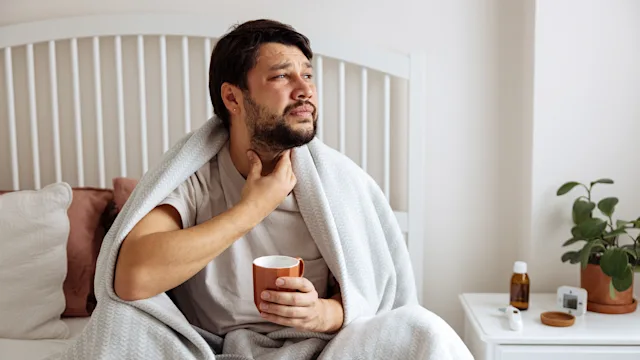Key takeaways:
Hiccups are caused by uncontrolled contractions of your diaphragm. They’re not dangerous and usually go away on their own.
Certain maneuvers you can try at home may help to stop your hiccups right away.
Very rarely, hiccups can be caused by a medical problem. See a healthcare professional if your hiccups last for more than 2 days.
Almost everyone has had hiccups at some point in their lives. Hiccups aren’t dangerous and they almost always go away on their own. Still, they can be annoying when you get them. So, the first thing you usually want to know is how to make them go away fast.
Hiccups happen when your diaphragm involuntarily contracts. This involuntary movement usually happens because the nerves that connect to your diaphragm get irritated. Because of this, many hiccup remedies are based on maneuvers that calm these irritated nerves.
So, what exactly are these maneuvers? And how quickly do they work? Keep reading to find out how to stop hiccups fast.
How to get rid of hiccups fast
The most popular cures for hiccups are based on maneuvers that activate the vagus nerve. That’s because the vagus nerve connects to your diaphragm and is part of the reflex system that causes hiccups. Activating your vagus nerve can calm your diaphragm, break your hiccups reflex, and stop your hiccups. Some breathing techniques might also help to increase the amount of carbon dioxide (CO2) in your blood just a bit.
Try any of these techniques at home to stop your hiccups:
Close your eyes and apply light pressure to your eyelids with your fingers
Swallow small amounts of ice
Bear down as if you’re trying to have a bowel movement
Apply pressure to your ear canals
Pull your knees up to your chest and rock back and forth
Swallow a spoonful of sugar
Bite into a lemon
Hold your breath briefly
Breathing into a paper bag for a short amount of time
What works for you might not work for others. So, finding the best method for you may take some trial and error.
5 things not to do when you have hiccups
When you have hiccups, it’s best to avoid anything that could further irritate the vagus nerve. Here are things that you should avoid doing when you have hiccups:
Drinking carbonated beverages
Eating spicy foods
Drinking alcohol
Eating very quickly
Chewing gum
It seems everyone has a “get-rid-of-hiccups” trick to share. You can try the methods these four people swear by.
Did you know dogs can get hiccups too? It’s true, and their triggers are actually similar to those in humans.
Hiccups can be a side effect of nicotine gum. You can minimize the risk of this and other side effects by making sure you use the gum correctly.
What causes hiccups?
Hiccups are involuntary contractions of your diaphragm, a respiratory muscle below the lungs. They happen when something activates a reflex arc involving your diaphragm, vagus nerve, and phrenic nerve. When any part of this reflex arc gets irritated for any reason, your body begins an uncontrollable cycle of diaphragm contractions known as hiccups.
Hiccups can be triggered by a lot of different things. Eating or drinking — especially spicy foods, alcohol, and carbonated drinks — can cause hiccups. Swallowing lots of air, which can happen when smoking or when chewing gum, can also activate hiccups.
Some people get hiccups from stress or strong emotions. There have even been reports of people getting hiccups from laughing too hard.
Read more like this
Explore these related articles, suggested for readers like you.
Because hiccups aren’t dangerous and they usually go away on their own, there’s not a lot of research into why these things cause hiccups. So even though we know that stress, strong emotions, and laughter can cause hiccups, nobody knows exactly why they do.
What should you do if you have chronic hiccups?
Chronic hiccups are different from regular hiccups. They’re hiccups that last for more than 48 hours. Chronic hiccups are usually caused by some sort of medical problem.
Lots of different medical conditions can lead to chronic hiccups. Examples include:
Central nervous system disorders like Parkinson’s disease, stroke, or brain injury
Gastrointestinal problems like acid reflux
Lung conditions like pneumonia or asthma
Medication side effects
Unlike regular hiccups, chronic hiccups usually don’t go away with the normal techniques listed above. Because chronic hiccups can be caused by a medical condition that needs treatment, you should see a healthcare professional if your hiccups last more than 48 hours. They can help determine the cause and find the right treatment.
The bottom line
Almost everyone experiences hiccups at some point in their life. Hiccups are usually caused by the activation of a reflex arc in your body, leading to involuntary contractions of your diaphragm. To help them go away faster, you can try to blunt the reflex arc causing the hiccups. Doing things like applying pressure to your eyes or holding your breath for short periods can activate your body’s vagus nerve. These techniques can effectively “short-circuit” the reflex arc that’s causing your hiccups.
The vast majority of the time, hiccups aren’t dangerous and go away on their own. In rare cases, hiccups can last a long time. If you have hiccups that won’t go away, it’s best to get medical attention to find out if something else is causing your hiccups.

Why trust our experts?



References
Baquiran, M., et al. (2023). Anatomy, head and neck: Anterior vagus nerve. StatPearls.
George, J., et al. (1996). Hyponatraemia and hiccups. The National Medical Journal of India.
Hadjiliadis, D., et al. (2023). Diaphragm and lungs. MedlinePlus.
Kenny, B. J., et al. (2022). Neuroanatomy, cranial nerve 10 (vagus nerve). StatPearls.
National Health Society. (2023). Hiccups.
Oliver, K. A., et al. (2023). Anatomy, thorax, phrenic nerves. StatPearls.
Petroianu, G. A. (2015). Treatment of hiccup by vagal maneuvers. Journal of the History of the Neurosciences.
Steger, M., et al. (2015). Systemic review: The pathogenesis and pharmacological treatment of hiccups. Alignment Pharmacology and Therapeutics.


















